Letters from Fred Leslie Biddle to his Mother, 1916-1917, Part 9 of 24
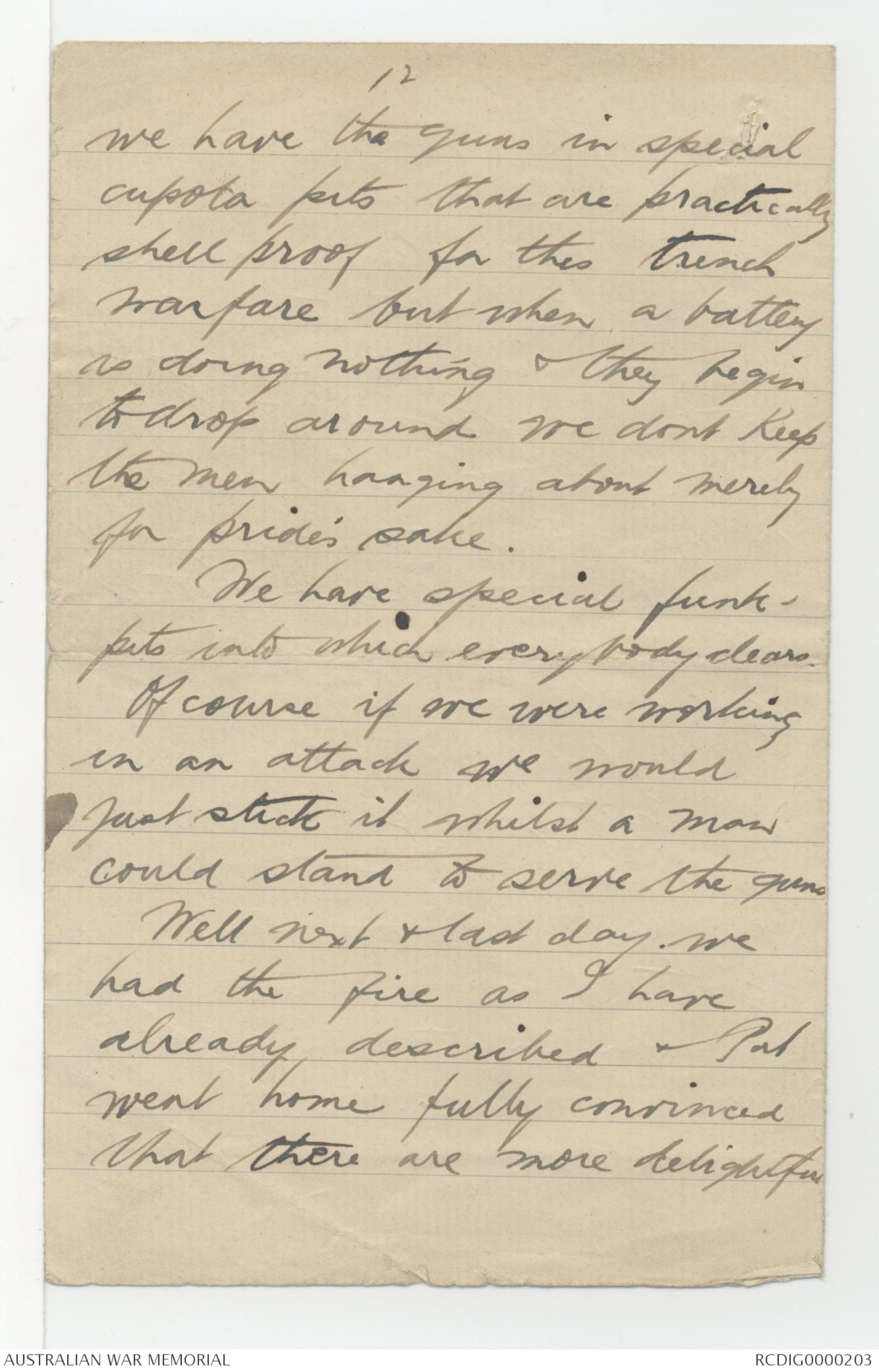
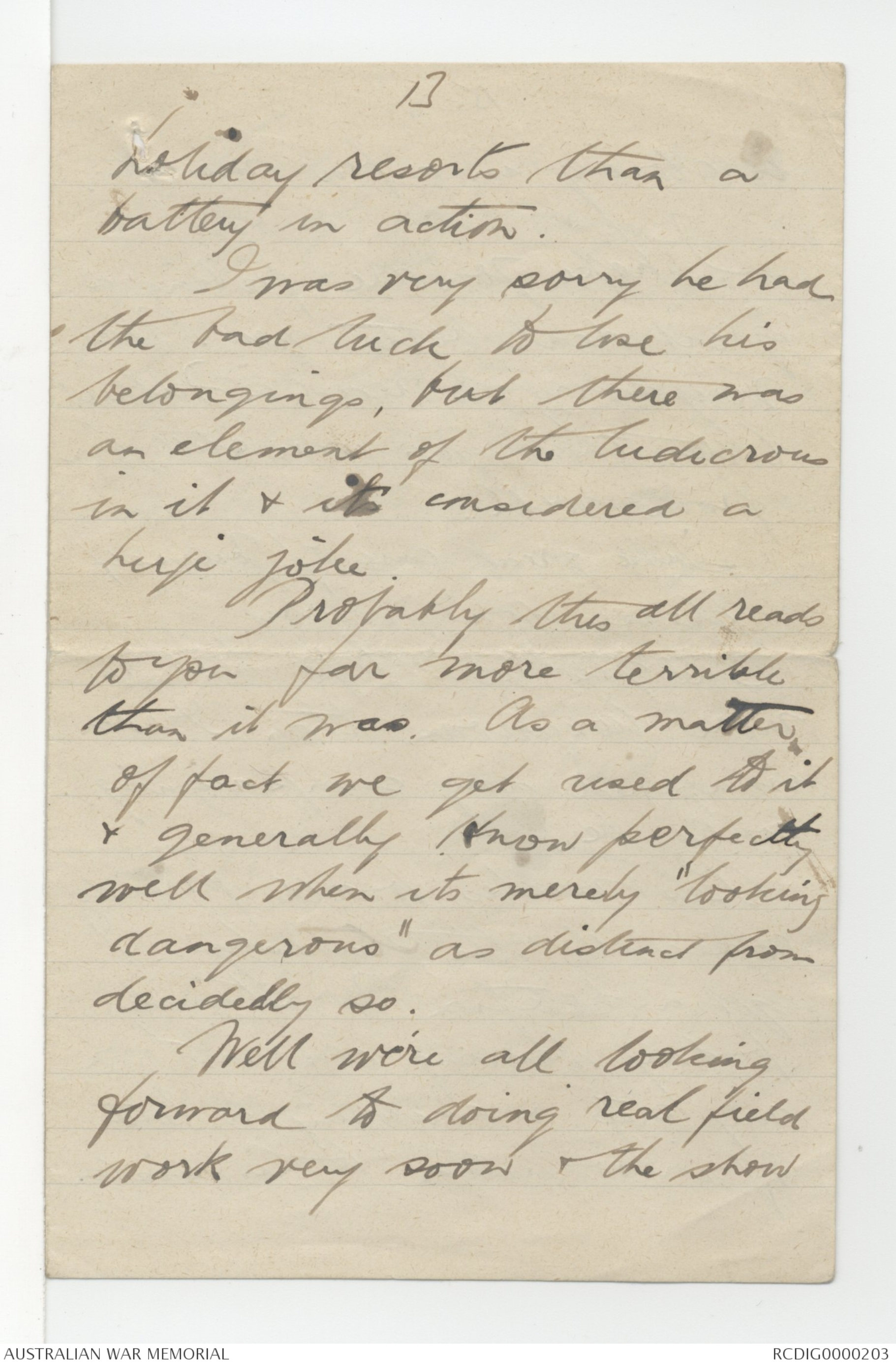
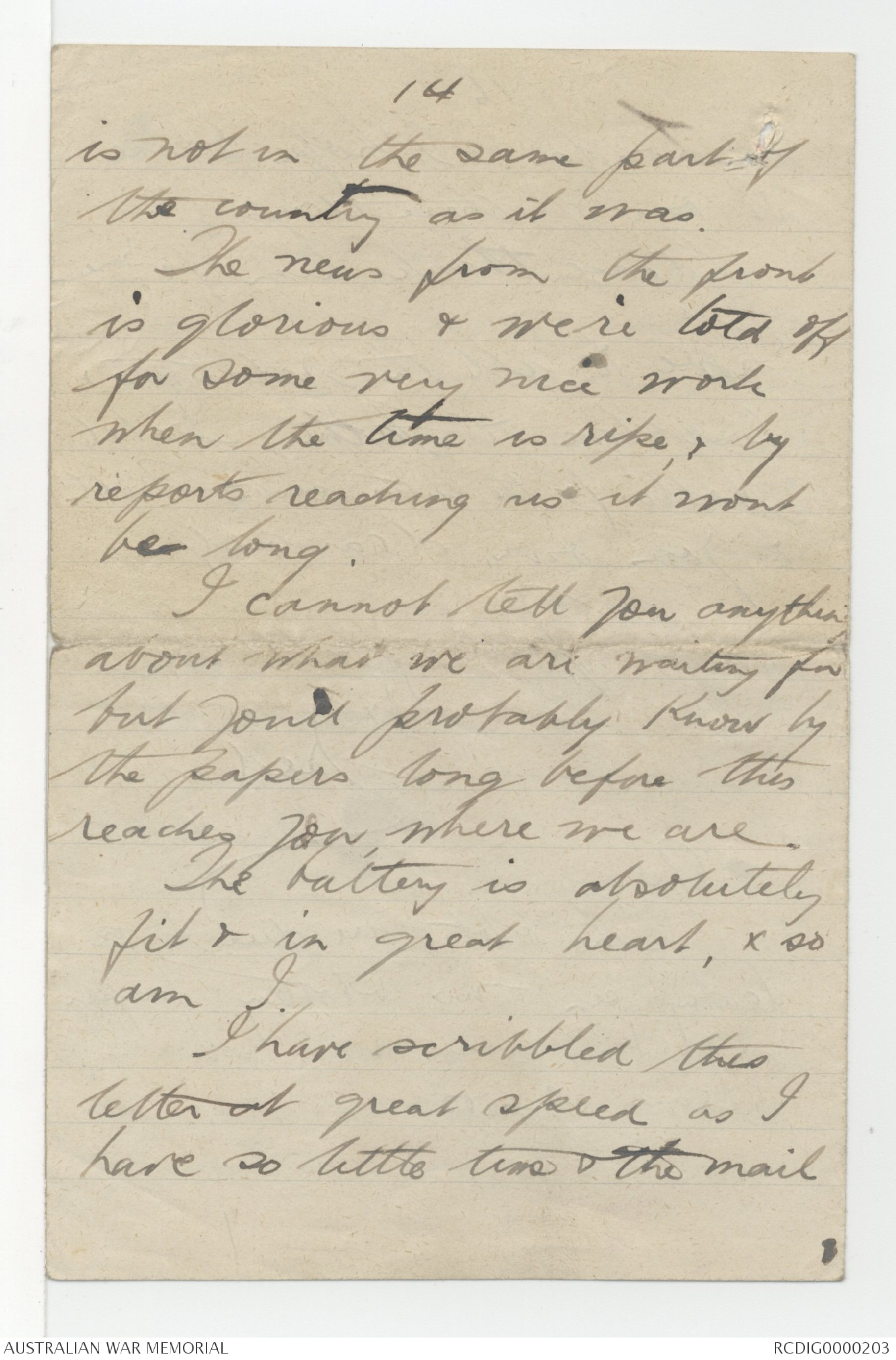
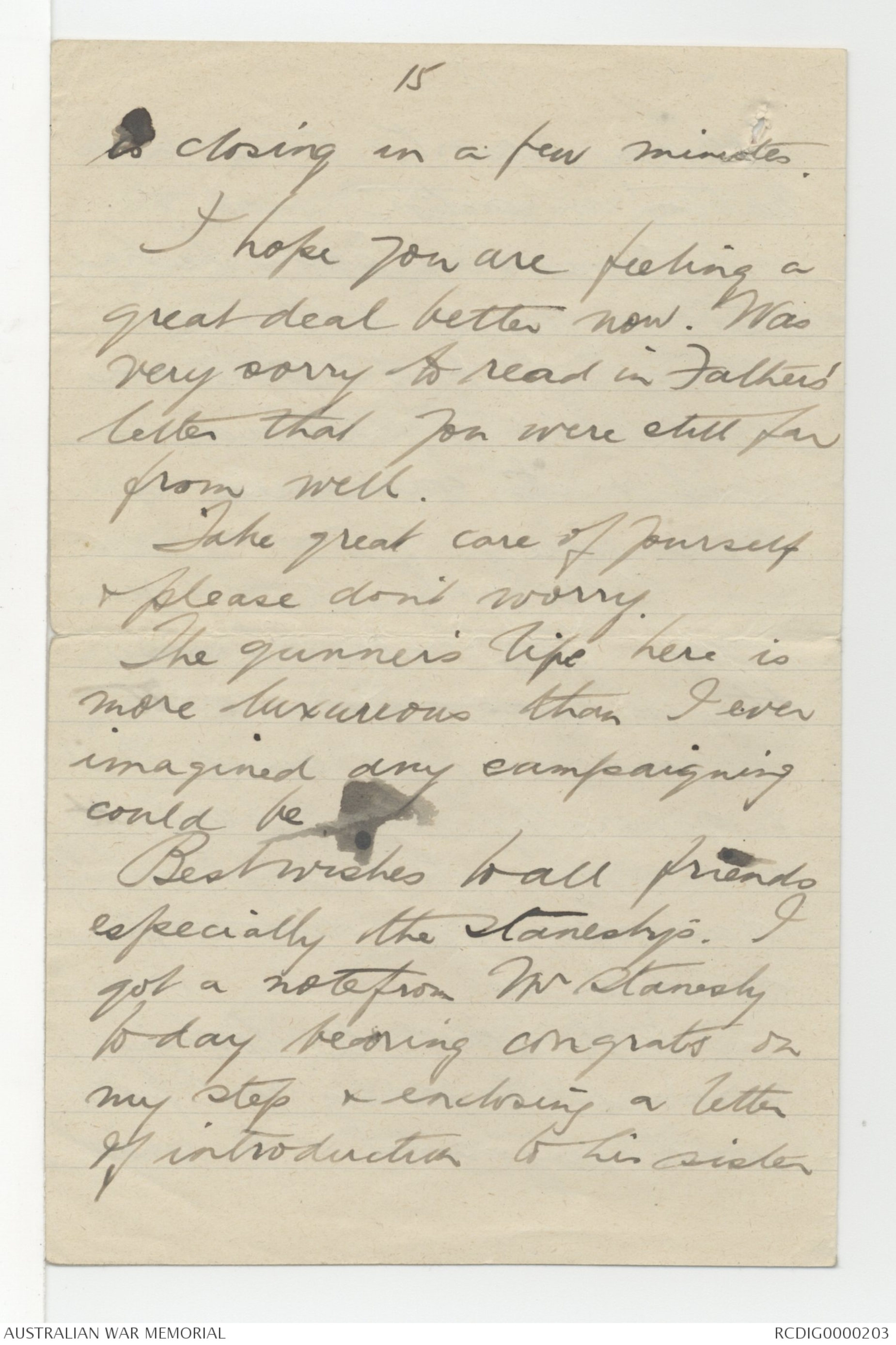
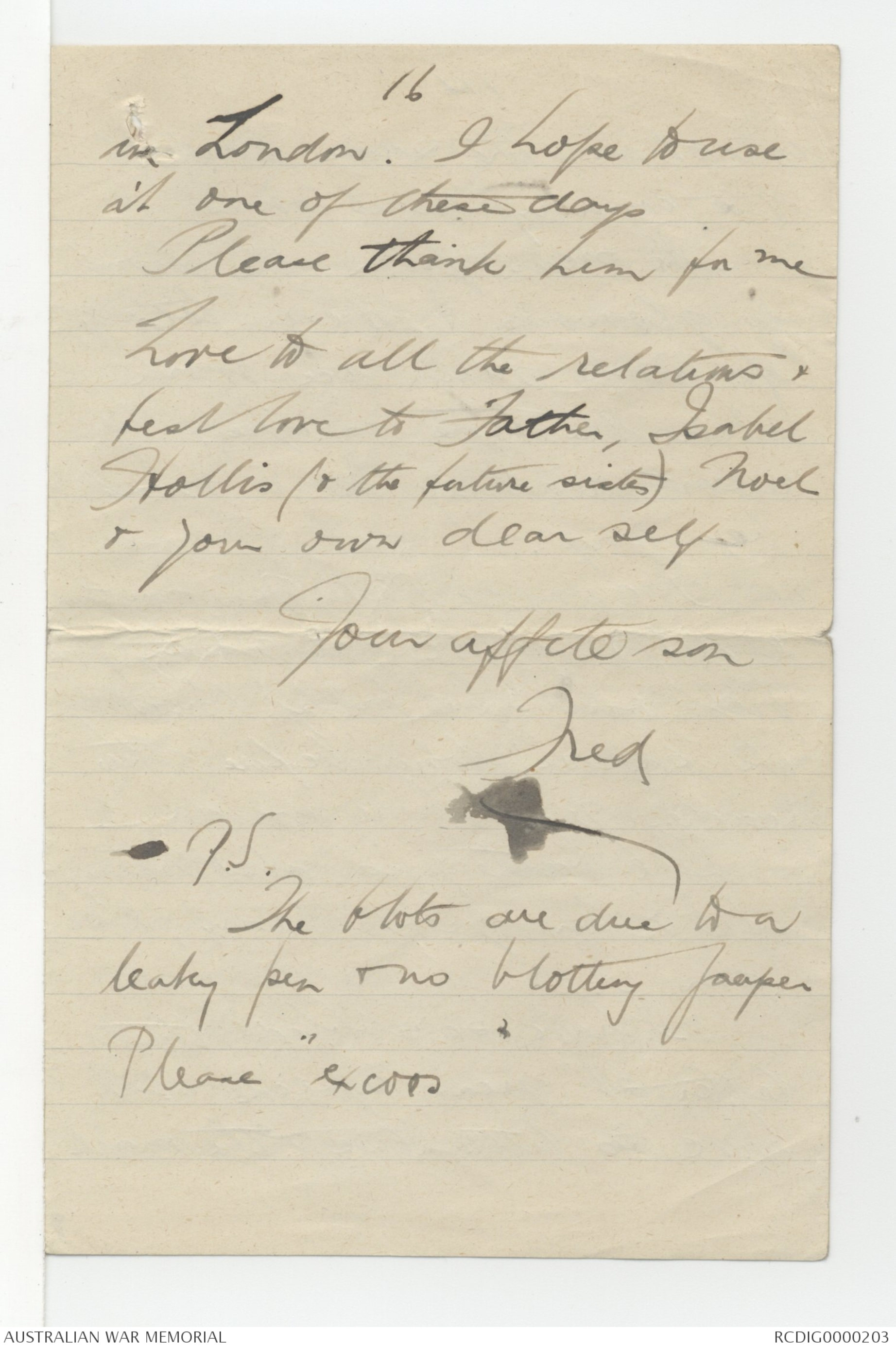
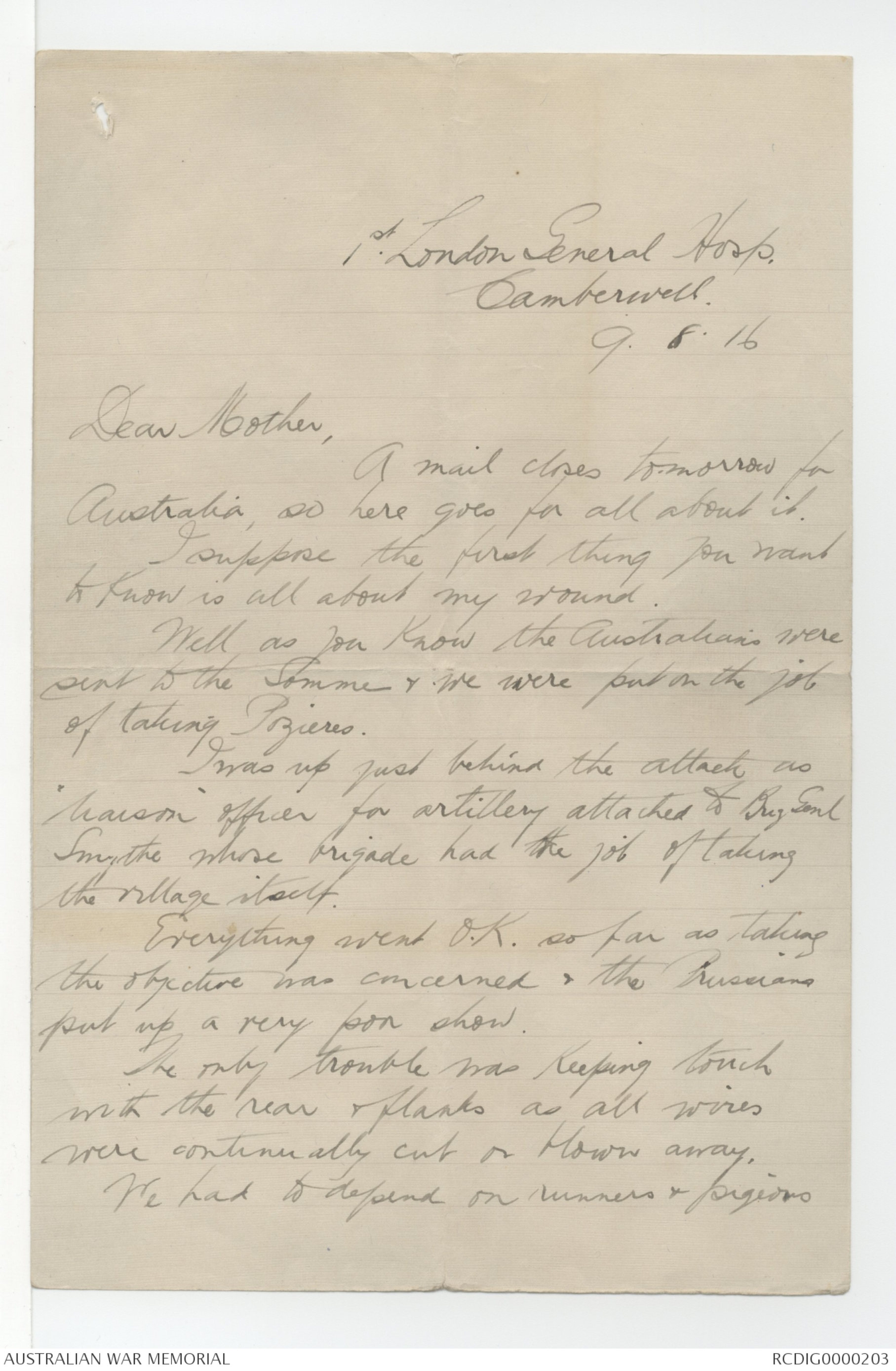
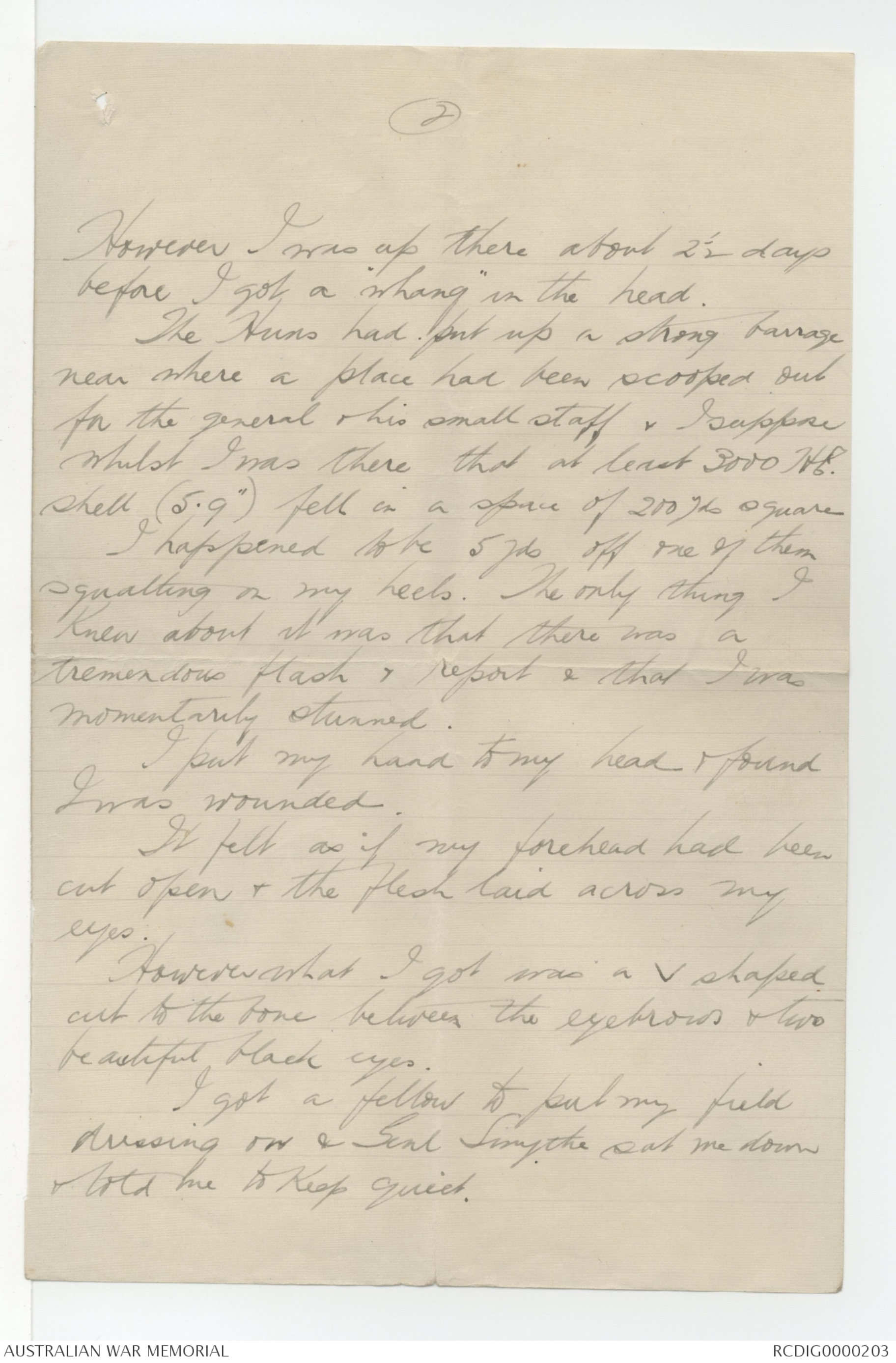
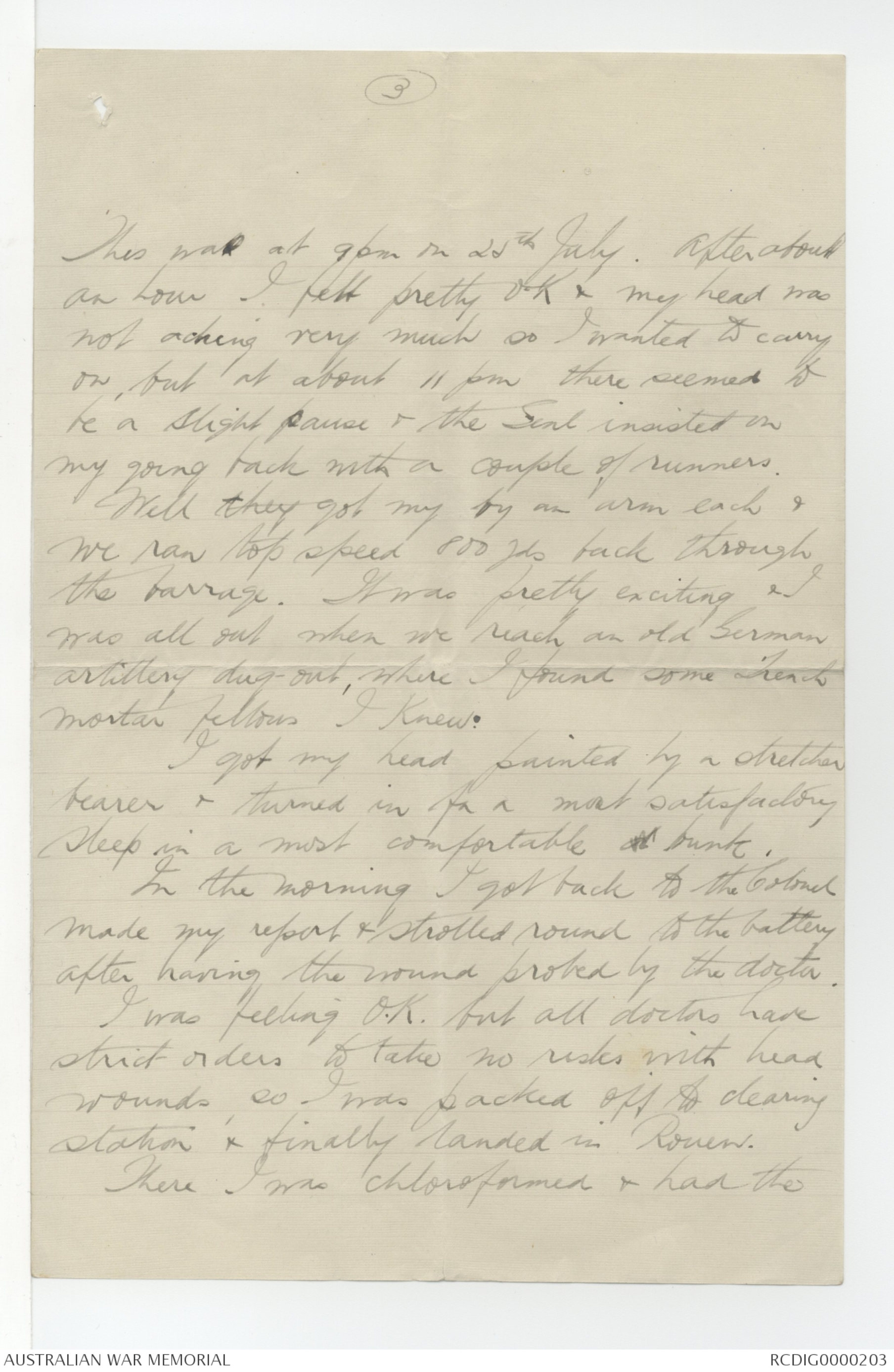
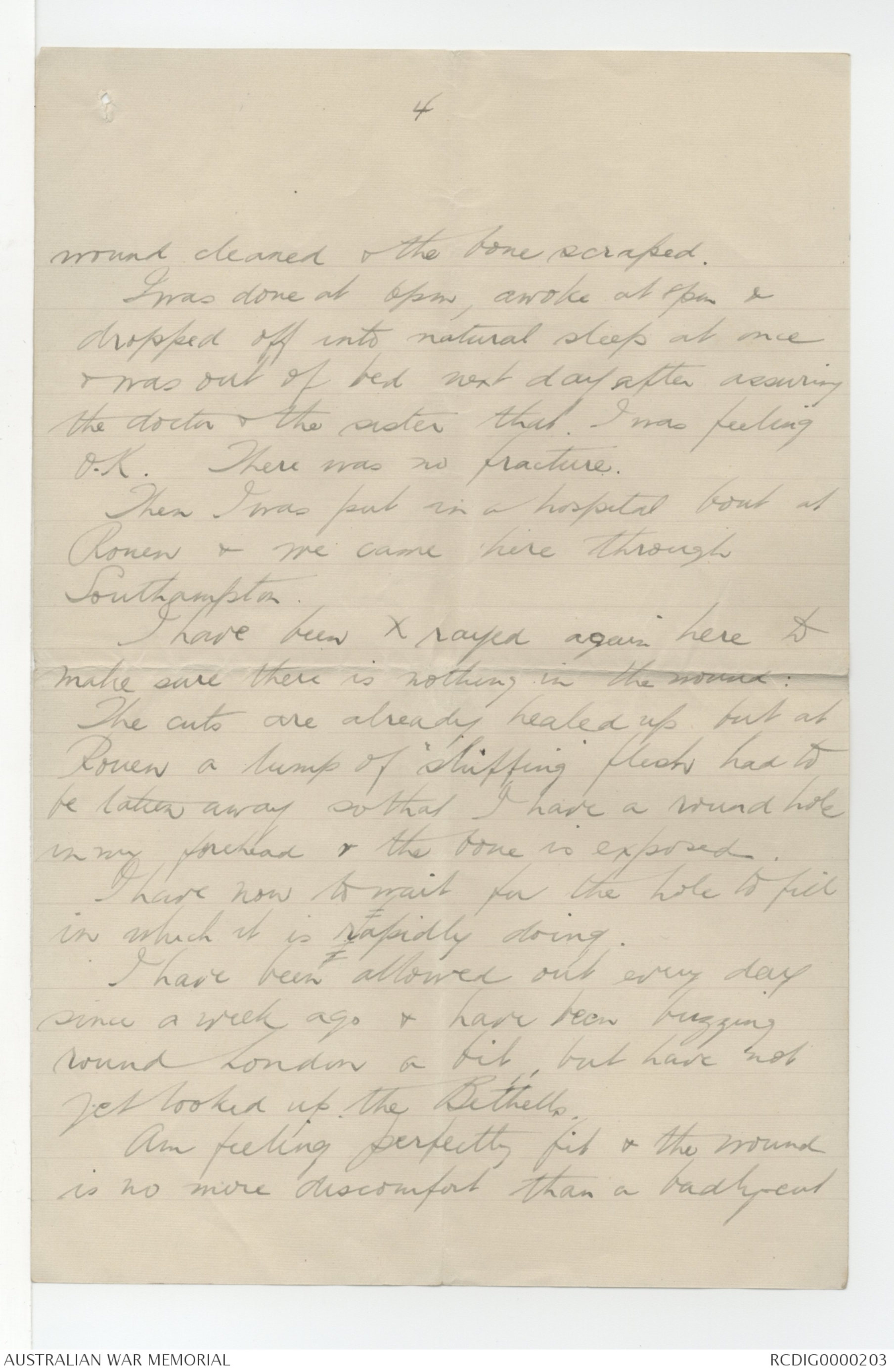
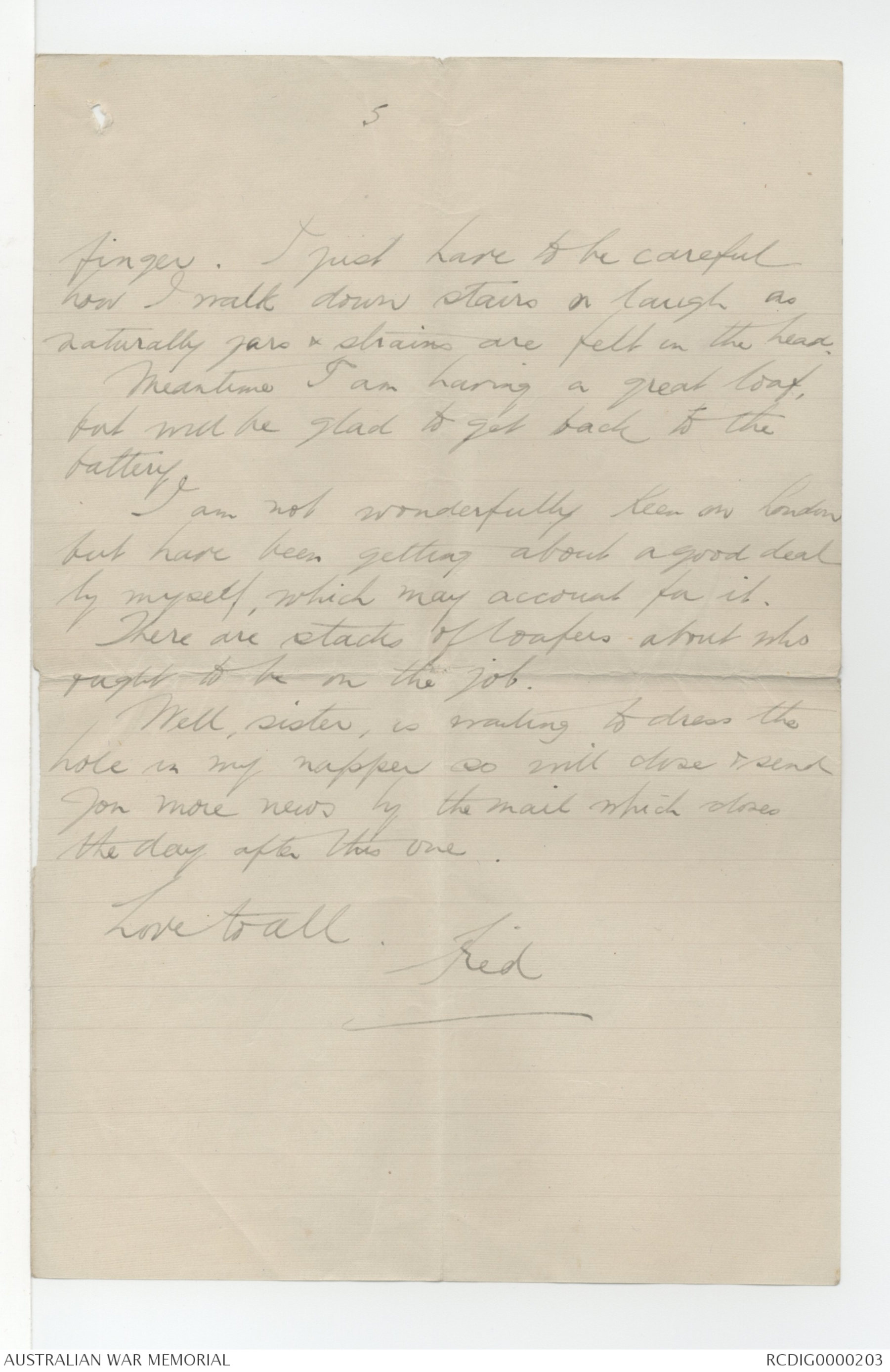
12
we have the guns in special
cupola pits that are practically
shell proof for this trench
warfare but when a battery
is doing nothing & they begin
to drop around we dont keep
the men hanging about merely
for pride's sake.
We have special funk
pits into which everybody clears.
Of course if we were working
on an attack we would
just stick it whilst a man
could stand to serve the guns.
Well next & last day we
had the fire as I have
already described & Pat
went home fully convinced
that there are more delightful
13
holiday resorts than a
battery in action.
I was very sorry he had
the bad luck to lose his
belongings, but there was
an element of the ludicrous
in it & it's considered a
huge joke.
Probably this all reads
to you far more terrible
than it was. As a matter
of fact we get used to it
& generally know perfectly
well when its merely "looking
dangerous" as distinct from
decidedly so.
Well we're all looking
forward to doing real field
work very soon & the show
14
is not in the same part of
the country as it was.
The news from the front
is glorious & we're told off
for some very nice work
when the time is ripe, & by
reports reaching us it wont
be long.
I cannot tell you anything
about what we are waiting for
but you'll probably know by
the papers long before this
reaches you, where we are.
The battery is absolutely
fit & in great heart, & so
am I.
I have scribbled this
letter at great speed as I
have so little time & the mail
15
is closing in a few minutes.
I hope you are feeling a
great deal better now. Was
very sorry to read in Father's
letter that you were still far
from well.
Take great care of yourself
& please don't worry.
The gunner's life here is
more luxurious than I ever
imagined any campaigning
could be.
Best wishes to all friends
especially the Stanesly's. I
got a note from Mr Stanesly
today bearing congrats on
my step & enclosing a letter
of introduction to his sister
16
in London. I hope to use
it one of these days.
Please thank him for me.
Love to all the relations &
best love to Father, Isabel
Hollis (& the future sisters) Noel
& your own dear self.
Your affcte son
Fred
P.S.
The blots are due to a
leaky pen & no blotting paper.
Please "excoos"
1st London General Hosp.
Camberwell
9.8.16
Dear Mother,
A mail closes tomorrow for
Australia, so here goes for all about it.
I suppose the first thing you want
to know is all about my wound.
Well, as you Know, the Australians were
sent to the Somme & we were put on the job
of taking Pozieres.
I was up just behind the attack as
"liaison" officer for artillery attached to the Brig Genl
Smythe whose brigade had the job of taking
the village itself.
Everything went O.K. so far as taking
the objective was concerned & the Prussians
put up a very poor show.
The only trouble was keeping touch
with the rear & flanks as all wires
were continually cut or blown away.
We had to depend on runners and pigeons.
2
However I was up there about 2½ days
before I got a "whang" in the head.
The Huns had put up a strong barrage
near where a place had been scooped out
for the general & his small staff & I suppose
whilst I was there that at least 3000 HE.
shell (5.9") fell in a space of 200 yds square.
I happened to be 5 yds off one of them
squatting on my heels. The only thing I
knew about it was that there was a
tremendous flash & report & that I was
momentarily stunned.
I put my hand to my head & found
I was wounded.
It felt as if my forehead had been
cut open & the flesh laid across my
eyes.
However what I got was a V shaped
cut to the bone between the eyebrows & two
beautiful black eyes.
I got a fellow to put my field
dressing on & Genl Smythe sat me down
& told me to keep quiet.
3
This was at 9 pm on 25th July. After about
an hour I felt pretty OK & my head was
not aching very much so I wanted to carry
on but at about 11 pm there seemed to
be a slight pause & the Genl insisted on
my going back with a couple of runners.
Well they got my by an arm each &
we ran top speed 800 yds back through
the barrage. It was pretty exciting & I
was all out when we reach an old German
artillery dug out, where I found some French
mortar fellows I knew.
I got my head painted by a stretcher
bearer & turned in for a most satisfactory
sleep in a most comfortable d bunk.
In the morning I got back to the Colonel
made my report & strolled round to the battery
after having the wound probed by the doctor.
I was feeling O.K. but all doctors have
strict orders to take no risks with head
wounds, so I was packed off to the clearing
station & finally landed in Rouen.
There I was chloroformed & had the
4
wound cleaned & the bone scraped.
I was done at 6 pm, awoke at 8 pm &
dropped off into natural sleep at once
& was out of bed next day after assuring
the doctor & the sister that I was feeling
O.K. There was no fracture.
Then I was put in a hospital boat at
Rouen & we came here through
Southampton.
I have been X rayed again here to
make sure there is nothing in the wound.
The cuts are already healed up but at
Rouen a lump of "sluffing" flesh had to
be taken away so that I have a round hole
in my forehead & the bone is exposed.
I have now to wait for the hole to fill
in which it is rapidly doing.
I have been allowed out every day
since a week ago & have been buzzing
round London a bit, but have not
yet looked up the Bethells.
Am feeling perfectly fit & the wound
is no more discomfort than a badly cut
5
finger. I just have to be careful
how I walk down stairs or laugh as
naturally jars & strains are felt in the head.
Meantime I am having a great loaf,
but will be glad to get back to the
battery.
I am not wonderfully keen on London
but have been getting about a good deal
by myself, which may account for it.
There are stacks of loafers about who
ought to be on the job.
Well, sister, is waiting to dress the
hole in my napper so will close & send
you more news by the mail which closes
the day after this one.
Love to all
Fred
 Jacqueline Kennedy
Jacqueline KennedyThis transcription item is now locked to you for editing. To release the lock either Save your changes or Cancel.
This lock will be automatically released after 60 minutes of inactivity.